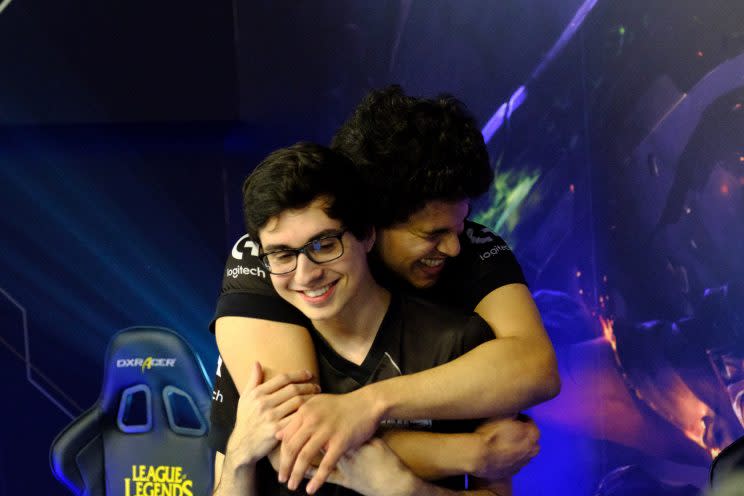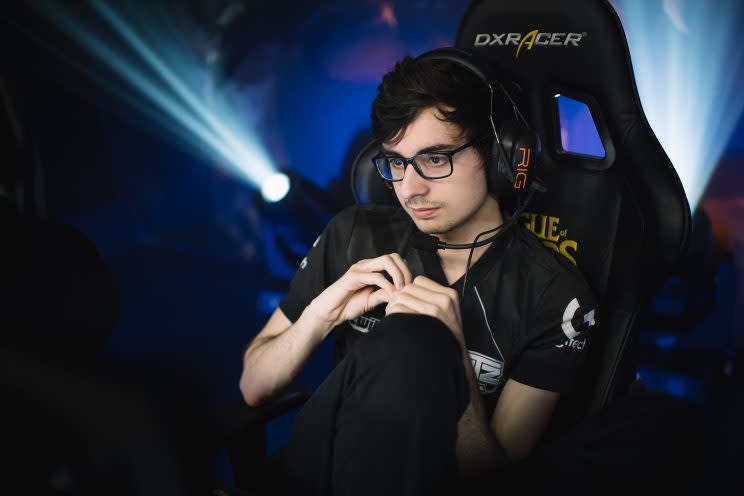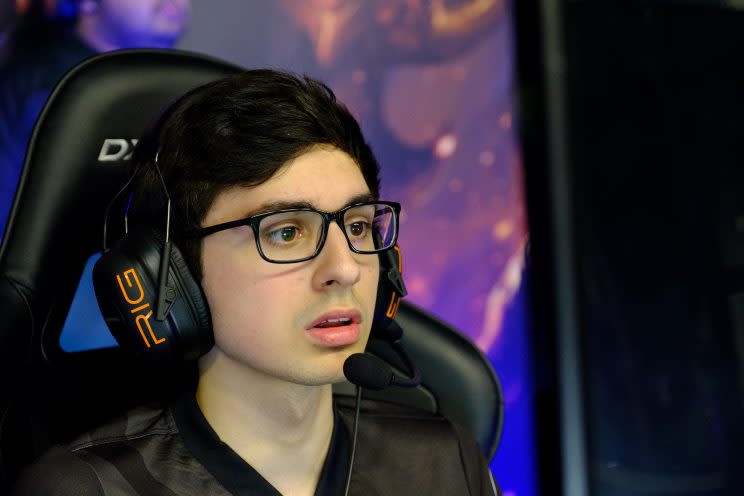'Brazilian Apdo' no more: Diogo "Shini" Rogê

He doesn’t believe it.
At 46:16, Diogo “Shini” Rogê jumps onto CNB e-Sports Club’s Thiago “TinOwns” Sartori. TinOwns is 13/2/4 on LeBlanc. He’s spent the better part of the game making INTZ e-Sports’ lives miserable since scoring First Blood onto Shini five minutes into the game.
INTZ AD carry Micael “micaO” Rodrigues kills TinOwns five seconds later. The assist gives Shini a positive scoreline for the first time all game. The INTZ jungler was down 0/4/0 in the midgame, when CNB had all but won.
Falling at 47:31, Shini is the last of his team to die. A second later, INTZ e-Sports take the Nexus. They win, still down 4.8K gold.
Beside him, mid laner Bruno “Envy” Farias tears off his headset, springing up from his chair and screaming. To his right, top laner Marcelo “Ayel” Mello erupts into cheers. He shouts into the crowd while Shini runs his hands through his hair, tugging at it almost violently.
He still doesn’t believe it. After a small pause, Shini shakes Envy’s hand in disbelief. Envy pulls him into a hug, smiling at the in-studio cameras. The INTZ e-Sports logo appears.
“INTZ e-Sports VITÓRIA.”
Ayel is on the floor, laughing and slapping his knee repeatedly while the rest of the team gathers him to shake hands with CNB. Shini is last in line, quiet compared to his more boisterous teammates, one hand over his stomach as if he’s about to be ill.
It isn’t a good game for either team, particularly INTZ.
“You shouldn’t congratulate me,” Shini says after the win. “We don’t deserve it.”
“Everyone was like, ‘Okay, we got three points but we definitely got lucky and didn’t deserve the win.’ But it’s good. Kinda like a small wake-up call early on.”
This second game against CNB e-Sports Club marks the auspicious professional debut of Diogo “Shini” Rogê, the 20 year-old jungler more famously known on his home server as “Brazilian Apdo.”

Small punishments are handed down fairly regularly in professional League of Legends — inappropriate clothing or not putting on makeup before going onstage are a few of the more humorous infractions documented by China’s L.ACE.
Every competitive split, KeSPA fines or docks points from teams for showing up to the studio late or players for logging out prior to the game’s completion, which is seen as bad-mannered or poor sportsmanship. In 2016 CBLoL Winter, Brazil’s own Big Gods — a team now trying to make their way through the North American Challenger Series — were docked 16 points prior to the season’s start for failing to submit their roster on time.
More noteworthy individual offenses include solo queue toxicity and Elo boosting (as it’s also known in Brazil, the Elojob), or boosting another person’s League of Legends account for money. Both of these are against the League of Legends terms of service. While not as severe as fixing a match, boosting accounts is generally frowned-upon by the community for corrupting the integrity of the solo queue ladder.
Elo boosting can also be exceptionally profitable.
The most infamous Elo booster of them all is Korea’s Jeong “Apdo” Sang-gil. A bright, charismatic, and good-looking player, Apdo burst onto the scene in Season 2 thanks to his solo queue exploits. His notoriety only grew throughout Season 3 when he reached Rank 1 on the Korean server — something that immediately garners attention from teams and other players, professional or no — and began boosting accounts for money.
In Korea, the expectation is that great players want to become professionals. The path is as follows: reach a high rank on the solo queue ladder, earn a tryout or a spot on a team. Apdo broke tradition, declaring that he could make more money through Elo boosting than he ever could on a professional team. Although many of his accounts were banned, he continued to boost, even streaming his exploits. Contrary to the statement that he would never play professionally, he joined 양러왔습니다, which later renamed to Team Dark, for the 2013-14 Champions Winter Qualifier.
To this day, following a 1,000-year ban on his main account, a climatic ending to the Season 3 Korean ladder, and an ill-fated encounter prior to his team’s appearance in the qualifier that led to his ban, Apdo remains somewhat of an enigma. His talent is obvious, as he’s proven time and again on both the Korean and Chinese servers. What if Apdo had been allowed to play for Team Dark? Would he contend with Faker for the title of best player in the world? Does he still not want to become a professional player? Why, if he didn’t want to compete, did he join Team Dark? What if he were allowed to compete in LoL Champions Korea now?
He has never played professionally, and these questions linger to this day, as does his cult following.

During the 2014-15 offseason, rumors of multiple current or up-and-coming professional players Elo boosting circulated through the Brazilian scene. This coincided with a larger international spotlight on the Brazilian LoL scene following KaBuM! e-Sports Club’s appearance at the 2014 League of Legends World Championship. Brazil was to receive their own offline regular season, like North America and Europe’s League Championship Series and cries to make the region more professional were slowly starting to be answered.
In late December 2014, fan and community outrage around boosting by professional or notorious amateur players crested on Brazilian forums, spilling over onto Reddit. Posters expressed frustration that these seemingly known boosters remained unpunished. Even when they were punished, it didn’t seem to matter. What was the loss of an account, a Challenger border, and icons when good money could still be be made?
Shini was one of these boosters.
“I started boosting after having some bad experiences with competitive play,” Shini says. “I used to get frustrated a lot at teammates and [thought] I was much better than I actually was. I thought the reason why any team I was on won games was because of me and when we lost was because of other people.”
The first fully-offline season of CBLoL began on January 17, 2015 with CNB e-Sports Club, Dexterity Team, INTZ e-Sports, paiN Gaming, Keyd Stars, JAYOB e-Sports, KaBuM! e-Sports, and KaBuM! e-Sports Black. Shini’s team had failed to qualify. Turning to boosting seemed logical at the time, due to his solo queue prowess.
“I just decided to give up outright competitive play but still wanted to keep playing League,” he says. “I enjoyed playing solo queue, [I’ve] always have been top of the ladder, so in my mind at the time it was like putting two and two together.”
Another wave of bans trickled down from Riot Games Brazil and this time they included Shini.
After investigations, it was confirmed that the player Diogo “Shini” Rogê practiced what is popularly known as “elojob”, thus violating the code of conduct of League of Legends.
All punishments players receive on their accounts are reflected directly in their participation in competitive events hosted by Riot, so Shini, a member of the Keyd Warriors team, is suspended for a one-year period of official Riot competitions.
-From Shini’s competitive ruling, Riot Games Brazil
Now banned from professional play for a year, Shini posted an update to Facebook saying that he would continue boosting in lieu of playing in CBLoL. He stated that he wasn’t doing it for the money, or because Brazilian teams paid less than Elo boosting, but that he wanted to play LoL without pressure.
“I’m sorry, but I’m not going to do something that I hate just to make money,” he wrote. “I get very unhappy and disgruntled having to train and be forced to practice with champions that I really do not like to play. Whoever says that [professional gaming is] the dream job is not mistaken, but it depends on which person we are talking about. And in my case, it is not the work of dreams, quite the contrary.”
He wrapped up the post by affirming that he would continue to Elo boost. Riot could ban him from competitive for 1,000 years if they wanted to, he said, joking that his regular account was already banned for the same amount of time.
A handsome, talented, and unapologetic young man, Shini fit the Apdo mold. Brazilian League of Legends fans recognized the connection and ascribed to him a certain kind of swagger or arrogance, cheering or denigrating him as the “Brazilian Apdo.”
“I’ve heard [the nickname] a few times and just didn’t think much about it,” Shini says. “Only things we had in common were boosting, getting high elo pretty easily and making some spicy statements. [Boosting] was a pretty stupid decision, but the aftermath helped me improve as a player, person, and teammate so hindsight is 20/20.”

Young and embittered by his team’s failure, Elo boosting had seemed the most favorable option in Shini’s mind. It’s a decision that he doesn’t necessarily regret, but certainly recognizes as an aberration in what he now hopes will be a strong competitive career.
Having regret would imply a desire to erase all of his past mistakes, which isn’t something Shini wants. Instead, he now builds upon these missteps and learns from them. Forcibly sidelined, Shini watched others play competitively while he continued to play on the solo queue ladder. This fed his drive to return as a professional player.
“I actually missed the thrill of competition and the rush I felt when playing with something important on the line,” he says. “Leaving something I spent so much time on in a bad note left a sour taste in my mouth and hurt my pride a lot, so I eventually changed my mind partly due to maturing and spending time to actually think about what I want and like to do.”
“I really enjoy competing. It’s not that I even enjoy winning that much, I just hate losing with a passion.”
Due to his mechanical talent in solo queue and his time as a reserve or Challenger player, Shini received multiple offers from teams once his year-long ban expired. These bids ranged from Challenger teams to CBLoL squads. Shini turned down all of these offers in favor of helping create his own Challenger lineup, using g3nerationX’s Challenger Series seed.
“I used the spot in Challenger Series to see what would happen, if I was good enough to lead a team,” he says. “If I couldn’t even win Challenger Series, did I really deserve or have the level of play to be in CBLoL?”
Shini’s new Team Genesis initially consisted of Shini, top laner Mateus “FitzRoy” Cayres, mid laner Alan “Rivabene” Rivabene, AD carry Luis “Absolut” Felipe Carvalho, and support Emerson “BocaJR” Alencar. Although they did not qualify for CBLoL their first split, the team later impressed in the XLG SuperCup 2016, beating out a few current CBLoL teams to place third overall.
In December 2016, the Team Genesis roster of Shini, top laner Álvaro “Verto” Miguel Martins, mid laner João “Marf” Piola, Absolut, and support Ygor “RedBert” Freitas were officially picked up by INTZ e-Sports as their Challenger lineup and renamed INTZ.Genesis. On March 18, 2017, two years after his ban from competitive play, Shini qualified for CBLoL with a 3-2 victory over Operation Kino.
After finally achieving his goal of making it back into CBLoL, Shini accepted an offer from INTZ to become a part of their main roster, splitting time with the team’s other starting jungler Gabriel “Turtle” Peixoto.

Between Game 1 and 2 against CNB, INTZ e-Sports announces their jungle substitution, Shini in for Turtle. His official debut begins with him giving up First Blood to TinOwns after an ill-advised reengage onto Gustavo “Minerva” Alves’ Ivern. Shini purses his lips, immediately unhappy with his own decision.
The game quickly spirals out of control for INTZ. TinOwns’ LeBlanc takes over the game. Shini desperately tries to get his team back into the game, but commits to overly-aggressive plays.
After the unexpected win, Shini is cautiously optimistic.
“I feel good, even though I didn’t play well at all, coming back from such a huge disadvantage — [the] game was 12 to 0 at one point, the other team had a 10k gold lead and got like three inhibs twice and three barons — is such a good feeling,” he says. “Seeing how much room we have to improve makes me very hopeful and ups my drive even more.”
There are few guarantees in professional League of Legends. At one point, Shini turned away from competitive play completely, promising never to return. Now he’s one of the players to watch during this CBLoL split.
A public figure for years, with various monikers ascribed to him, Shini doesn’t want people to forget the past, but wants to be judged on his play — and play alone.
“I don’t really like being in the spotlight that much,” he says. “I take these comparisons as something I find funny but deep down I want to be known as Shini or have my own nickname instead of the ‘next X player’ or as ‘the guy who’s had lots of potential for a long time.’”
Now in his first full professional season, he wants to win. Not as the “Brazilian Apdo” or “the next Revolta” but as Diogo “Shini” Rogê, jungler for INTZ e-Sports.
Emily Rand’s love of the 2013 KT Rolster Bullets will never die. You can follow her on Twitter.


